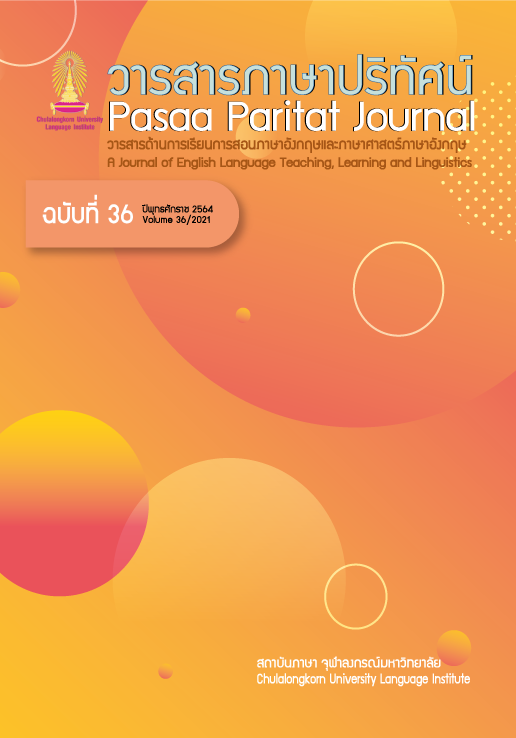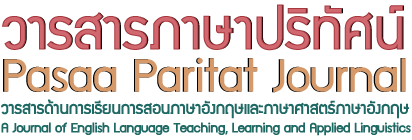Feasibility of Using Community-Based Learning in Thai EFL instruction
DOI:
https://doi.org/10.58837/CHULA.PPJ.36.2คำสำคัญ:
community-based learning, EFL, second language acquisition, Thailand’s educationบทคัดย่อ
It is claimed that the principles in the paradigm shift in second language acquisition has partly been implemented in the EFL (English as a Foreign Language) arena. How to make EFL pedagogies suit the shift then becomes an issue of interest for EFL authorities. In Thailand, such an interest has also been raised. This paper argues that community-based learning (CBL) enables Thai EFL instruction to chime with the shift. Moreover, given some commonalities among the principles in the paradigm shift, the principles in CBL, and the principles emphasised in the 1999 Thailand National Education Act, it could be expected that such integration is realisable in practice. In this paper, aside from a commentary on the integration, pedagogic implications involving CBL activities and roles of teachers in Thai EFL contexts are given and potential challenges discussed.
เอกสารอ้างอิง
Baker, W. (2003). Should Culture Be an Overt Component of EFL Instruction Outside of English Speaking Countries? The Thai Context. Asian EFL Journal, 5(4).
Bloom, B., Englehart, M., Furst, E., Hill, W., & Krathwohl, D. (1956). Taxonomy of Educational Objectives: The Classification of Educational Goals. Handbook I: Cognitive Domain. New York, Toronto: Longmans, Green.
Borg, S. (2003). Teacher Cognition in Language Teaching: A Review of Research on What Language Teachers Think, Know, Believe,
and Do. Language Teaching, 36 (2), 81-109.
Brookfield, S.D. (2012). Teaching for Critical Thinking: Tools and Techniques to Help Students Question their Assumptions. San Francisco: JosseyBass.
Comber, B. (2018). Community-Based Approaches to Foreign Language Education. Colombian Applied Linguistics Journal, 20(2), 151-
Demarest, A. (2014). Place-Based Curriculum Design. New York: Taylor & Francis.
Dörnyei, Z. (2014). The Psychology of the Language Learner: Individual Differences in Second Language Acquisition. New York:
Routledge.
Dörnyei, Z. & Murphey, T. (2003). Group Dynamics in the Language Classroom. Cambridge, England: Cambridge University Press.
Edwards, J. H. & Liu, J. (2018). Peer Response in Second Language Writing Classrooms. Ann Arbor, MI: University of Michigan Press.
Ellis, R. (2004). 21 Individual Differences in Second Language Learning. The Handbook of Applied Linguistics, 525.
Fischer, G., Rohde, M., & Wulf, V. (2007). Community-Based Learning: The Core Competency of Residential, Research-based Universities.
International Journal of Computer-Supported Collaborative Learning, 2(1), 9-40.
ดาวน์โหลด
เผยแพร่แล้ว
เวอร์ชัน
- 2023-07-14 (4)
- 2022-04-12 (3)
- 2022-04-05 (2)
- 2022-04-05 (1)
รูปแบบการอ้างอิง
ฉบับ
ประเภทบทความ
สัญญาอนุญาต
ลิขสิทธิ์ (c) 2022 วารสารภาษาปริทัศน์

อนุญาตภายใต้เงื่อนไข Creative Commons Attribution-NonCommercial-NoDerivatives 4.0 International License.



